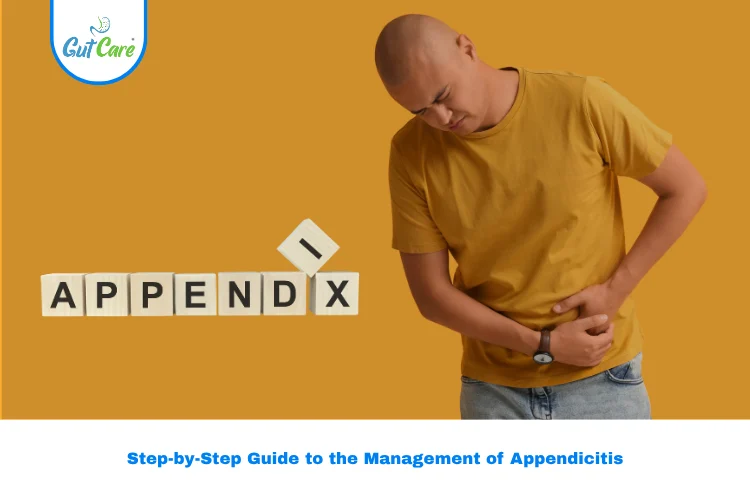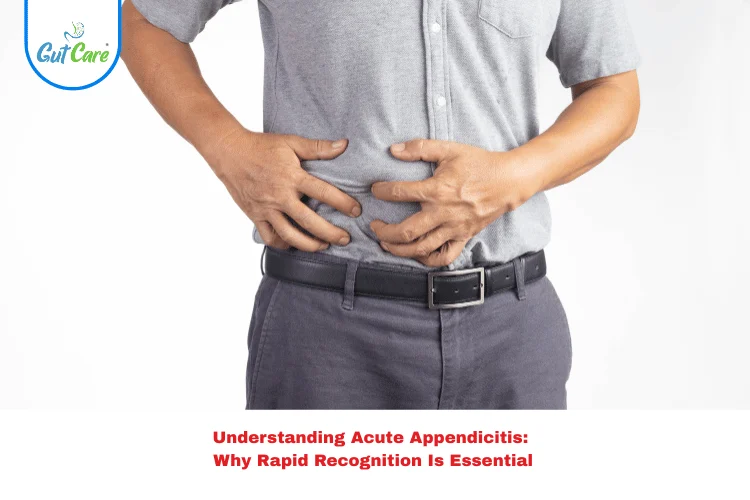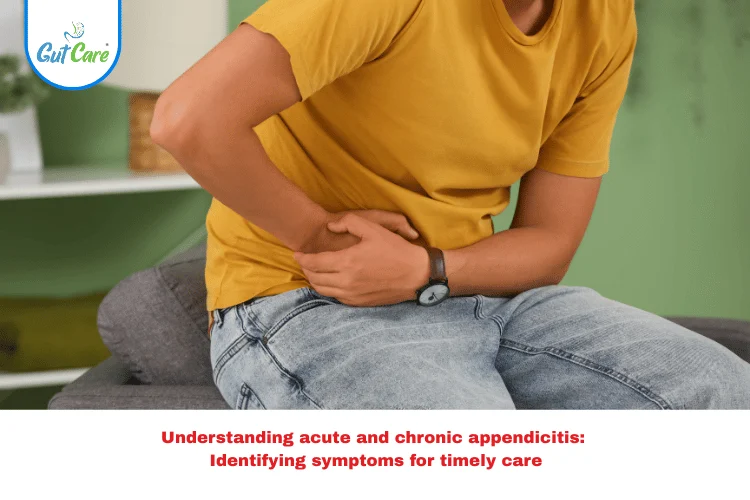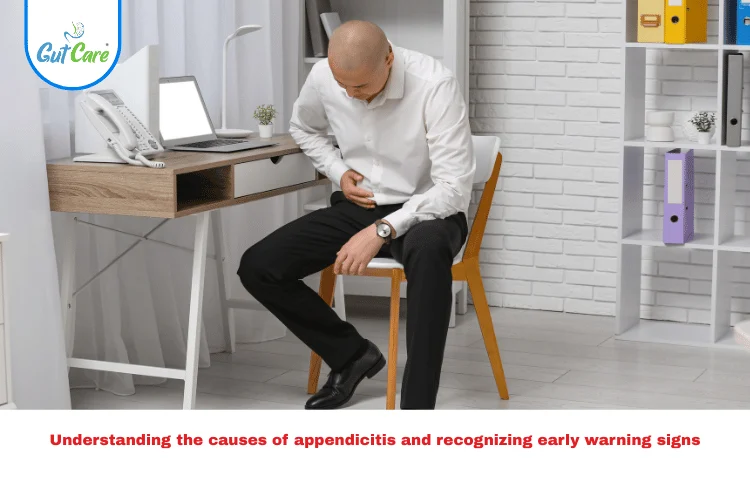Management of Appendicitis is a crucial medical process because untreated appendicitis can lead to severe complications like rupture, infection, and abscess formation. At Gutcare Clinics in Bangalore, under the guidance of Dr. Yuvrajsingh Gehlot, an experienced colorectal surgeon, patients receive comprehensive diagnosis and treatment tailored to their condition.
In this guide, we will define appendicitis, review its causes and symptoms, explain how it is diagnosed, and explore modern approaches to the management of appendicitis.
What Is Appendicitis?
To define appendicitis, it is the inflammation of the appendix a small finger-like pouch attached to the large intestine. Though small, it can become blocked or infected, leading to intense pain and requiring urgent medical attention.
Understanding the parts of appendix and how they function is important, though the appendix does not have a vital role in digestion. Its inflammation, however, is one of the most common surgical emergencies worldwide.
Step-by-Step Guide to the Management of Appendicitis
1. Initial Diagnosis
The process begins with an accurate appendicitis diagnosis. A colorectal surgeon may recommend:
- Physical examination (checking for tenderness in the lower abdomen)
- Blood tests to detect infection
- Imaging tests like ultrasound or CT scans
These tools confirm whether appendicitis is acute, chronic, or complicated.
2. Medical Stabilization
If infection is present, patients may first receive:
- Intravenous fluids to prevent dehydration
- Pain management for appendicitis pain symptoms
- Antibiotics to control infection before surgery
3. Surgical Management
The gold standard in the management of appendicitis is surgical removal, known as an appendectomy. Options include:
- Laparoscopic Appendectomy: Minimally invasive, faster recovery, fewer complications
- Open Surgery: Recommended if the appendix has ruptured or complications exist
At Gutcare Clinics, modern, minimally invasive methods are often used for better outcomes.
4. Post-Surgical Care
Recovery involves:
- Pain relief medications
- Gradual reintroduction of food
- Monitoring for signs of infection
- Follow-up visits with the colorectal surgeon
Patients are usually advised to avoid strenuous activities for a few weeks.
5. Appendicitis Prevention and Lifestyle Advice
Though appendicitis cannot always be prevented, some lifestyle habits may reduce risks:
- Eating a high-fiber diet to avoid constipation
- Staying hydrated
- Regular medical check-ups if you have a family history of appendix disease
Common Appendix Pain Causes
One of the first steps in the management of appendicitis is identifying the root cause. Common appendix pain causes include:
- Blockage by hardened stool (fecaliths)
- Swelling due to infection in the digestive tract
- Tumors or growths in rare cases
- Intestinal worms or foreign bodies
These blockages can trap bacteria, leading to infection and the classic appendicitis pain symptoms most patients describe.
Signs and Symptoms of Appendicitis
Recognizing early signs and symptoms of appendicitis can save lives. Patients typically experience:
- Sudden pain in the lower right abdomen
- Nausea and vomiting
- Loss of appetite
- Low-grade fever
- Constipation or diarrhea
- Worsening pain when coughing or walking
If untreated, the appendix can burst, causing widespread infection in the abdomen. This makes timely management of appendicitis critical.
Why Professional Care Matters
While home remedies may relieve mild digestive issues, appendicitis is not a condition to self-treat. Consulting a qualified specialist such as Dr. Yuvrajsingh Gehlot at Gutcare Clinics in Bangalore ensures you receive timely and accurate care. Professional management of appendicitis prevents life-threatening complications.
Conclusion
The management of appendicitis is a step-by-step process that begins with timely diagnosis and often requires surgical treatment for long-term relief. Recognizing the appendix pain causes, symptoms, and available treatments can help patients make informed decisions.
At Gutcare Clinics, patients receive advanced care from skilled colorectal surgeons, ensuring safe and effective treatment. If you experience persistent abdominal pain, don’t delay early medical consultation can make all the difference.
FAQs
1. What are the first steps in the management of appendicitis?
The first steps include diagnosis through physical exams, blood tests, and imaging, followed by antibiotics and surgery if necessary.
2. What are the most common appendix pain causes?
Blockage by stool, infection, or rarely tumors are common causes of appendicitis-related pain.
3. Can appendicitis be prevented?
While complete appendicitis prevention isn’t possible, a fiber-rich diet and good hydration may lower risks.
4. How long is recovery after the management of appendicitis?
Most patients recover within 1–3 weeks after laparoscopic surgery, though complex cases may take longer.
5. Does Gutcare Clinics in Bangalore provide appendicitis management?
Yes, Gutcare Clinics offers expert management of appendicitis under Dr. Yuvrajsingh Gehlot, providing advanced surgical and post-care solutions.




